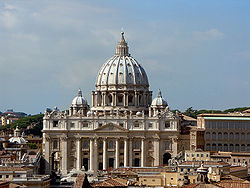
At 8 PM on Thursday February 28, Pope Benedict XVI will officially resign his position as leader of the Roman Catholic Church, in one of the most stunning moves in modern church history. With his resignation, Benedict XVI will become the first supreme pontiff in 600 years to willingly leave the position. The last time this happened was during the Great Schism, where three Popes simultaneously held sway over Europe’s most dominant religion. With their church now at a cross roads, and a power vacuum in the Vatican’s highest position, Christianity’s one billion followers must now consider what has lead to this unprecedented event, and the implications it may carry for the future of their ecclesiastical hierarchy.
Even for those individuals with no knowledge of the inner workings of Roman Catholicism, the resignation of a Pope has to elicit some amount of intrigue. What could lead a man to violate centuries of established tradition, and make him abdicate his position as the world’s most powerful religious figure? While Benedict XVI sights his poor health and advanced age as reason enough for his resignation, many are skeptical, as every pope for the last 600 years has died in office. And while this move may be an effort to avoid the onset of dementia or other illnesses that cause mental degradation while in office, it still does not explain the apparent disregard for tradition. Some suspect that a yet unknown scandal that could implicate the Holy Father could have forced this retirement, and in light of the indiscretions displayed by church leaders in the past decades, this theory has gained more ground. Coupled with the resignation of Britain’s top cardinal after being accused of “Improper Acts”, it’s hard not to wonder if this move is not Benedict XVI attempt to protect the image of the papacy. None the less, the man who sits on the throne of St. Peter has always been worthy of respect, and while speculation has run rampant, no evidence of scandal has been legitimately reported.
The issue of papal resignation also presents an unusual circumstance for the election of the next Pope. In the event of the Pope’s death, the College of Cardinal would be called into conclave after the 9 days of morning, also known as “Sede Vacante”, or the time of the empty throne. In sealed conclave in the Sistine Chapel, the cardinals then vote on the next supreme pontiff. However, the circumstances of this papal election are slightly different. On March 15, 15 days after Pope Benedict XVI vacates the Apostolic Palace, the cardinals will seal themselves in conclave without any outside intervention from the former Pope. A two thirds majority will then have to be reached on the next candidate, and as of February 18th, 117 of the College’s 209 members are eligible to vote. To be eligible to vote and be elected, a cardinal must be under the age of 80, and within the walls of the Sistine Chapel. The only added quirk is that as Pope, Benedict may chose to change the conditions of conclave in any way which he may chose, as he still holds complete power over all proceedings as of Thursday night. Of course, it is unlikely that the Holy Father would chose to make any Papal Mandates, however the amount of power still in the hands of the Pope is intriguing.
The circumstances surrounding Benedict’s resignation also raise the question what does a retired Pope do? It has already been decided that after a leave of absence, Benedict will return to Vatican City where he will live on church grounds, but that still does not answer what his role will be. The Pope is by definition Infallible, and yet, once he leaves office, Benedict will lose all ability to issue papal mandates, which begs the question, how can a man be infallible one minute and fallible the next? The holy father states that he will continue to do God’s work in any way that he can, but the presence of two living Popes in Vatican City at the same time may lead to conflicting interests, and a great deal of confusion within the Christian hierarchy.
Although the world may not know who will be the new leader of the Roman Catholic Church for another three weeks, speculation will continue to swirl in the intervening days about who will rise to claim the Ring of the Fisherman. In a time where Christian leadership has come under fire on all fronts for its indiscretions, many pray that a leader will emerge who can guide the Church into a new era of prosperity. Pope Benedict’s XVI resignation, while shocking and unprecedented, may be in fact a blessing in disguise, and may be a culture shock that can serve to help revive a beleaguered church.

